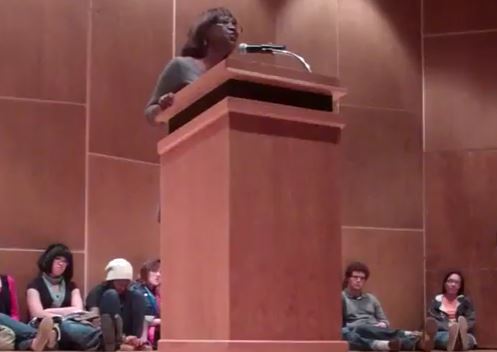
By Marlena Chertock
First published in The Writers’ Bloc.
Poet Patricia Smith realizes the power language has to transport you from one place to a better place. That is one reason she taught poetry to a sixth grade class in Florida, to students whose parents had died or were dying from AIDS.
That is also why the writer of six books of poetry started writing poems about Hurricane Katrina in her “Blood Dazzler” collection, Smith said during a Writers Here and Now reading on Wednesday, Oct. 26.
Smith wanted to make Hurricane Katrina as detailed and accessible to readers as possible.
“The majority of people experienced Katrina as I did, through a computer screen.”
Smith’s husband, an AP editor, sent reporters to New Orleans. He showed her their stories and photographs he couldn’t publish because they were too graphic. She used the reporters’ details, facts and images in her poems.
During the aftermath of Hurricane Katrina, Smith read about 34 nursing home residents who were left to die.
“34 was my attempt to give each of these people a little bit of their voice back,” she said.
Hurricane Katrina is personified in Smith’s poems as a woman. She also gave Katrina the other 2005 hurricanes as siblings.
Smith read several poems from “Blood Dazzler” on Wednesday, as well as poems focused on sex, love and other aspects of life.
She controlled the room, raising her voice up, almost screaming when necessary, and then whispering. She read in a powerful, ecstatic voice, changing intonations when she was reading from a different perspective or person.
Her poem about a black barbershop owner was one of the funniest. It seemed like Smith took on a different demeanor as she read the poem, reading in a different cadence and rhythm.
“Poetry can sometimes come from recreating voices,” Smith said.
Smith, who has a new collection coming out this spring, said she thinks of poetry as an aural process.
“I talk my poems all the time,” she said.
She said she wants to feel the rhythm in her words.
Smith often wrote sestinas, ghazals or tankas in “Blood Dazzler.”
Through editing, she believes poets are already adhering to a form, their own form.
“You need to develop your own signature,” she said.
Writers can’t develop their signature without a knowledge of form, according to Smith. Revision is also a way she gains more form and clarity. When she revises, she always colors her poems in more, tries to make the plain words less plain.
“You’ll reach a point in your life where you’ll realize you’re either writing recreationally, but your head is somewhere else,” Smith said. “Or you’re writing to move your own life forward.”
For Smith, writing has gone beyond choice.
“It’s something I need to do,” she said.
View videos of Patricia Smith’s reading and question and answer session on The Writers’ Bloc YouTube channel.